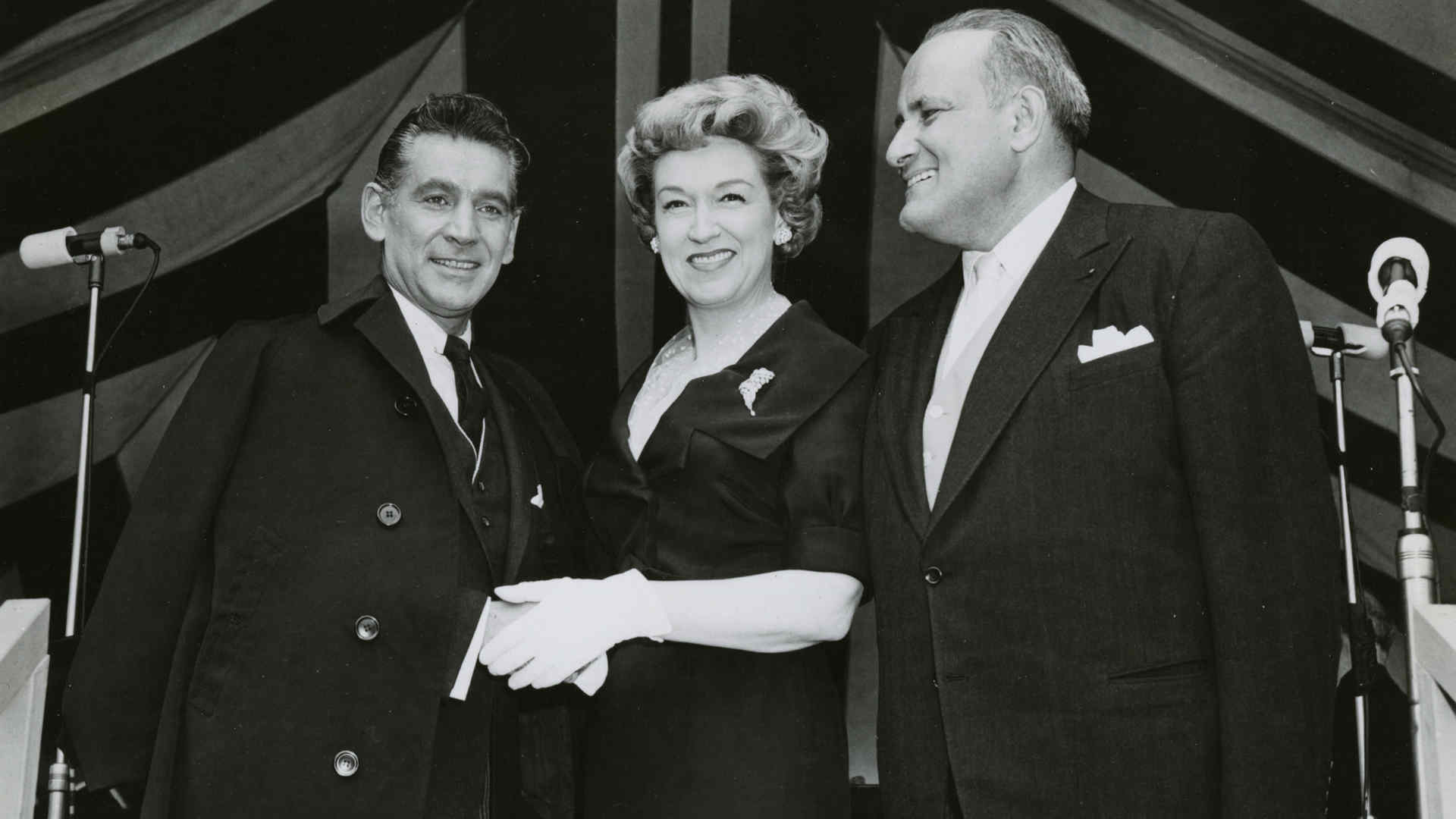
The Juilliard Orchestra begins its season with a rousing tribute to Leonard Bernstein. The Carnegie Hall concert on September 29 will be conducted by Bernstein protégée Marin Alsop (Pre-College ’72; BM ’77, MM ’78, violin) and will feature Bernstein’s Songfest as well as musical tributes by some of his Juilliard-affiliated colleagues—Luciano Berio (faculty 1965–73), John Corigliano (faculty 1991–present), John Williams (’55, composition), and William Schuman (president 1945–62)—collectively called a Bernstein Birthday Bouquet. The concert closes with a work that, on the face of it, might seem to be a bit out of place: Shostakovich’s Fifth Symphony. But as writer Thomas May shows, there were quite a few connections between these two giants of 20th-century music.
The story of a hitherto unknown young musician’s overnight transformation into a sensation is inescapable in any reckoning with the phenomenon we know as Leonard Bernstein. His 100th birthday, in August, has been the catalyst for a wave of international celebrations. And in the process, the famous scenario in question—how the 25-year-old assistant conductor made the front page of the New York Times after filling in for an indisposed Bruno Walter to debut with the New York Philharmonic—is often taken as the moment Bernstein launched his career. But that event—a Sunday matinee at Carnegie Hall on November 14, 1943—was just one of several landmark dates concentrated within a mere half-year, each presenting a different face of this un-classifiable genius. In April 1944, Bernstein introduced his first collaboration with the choreographer Jerome Robbins with the debut of their ballet Fancy Free (at the old Metropolitan Opera house), which in turn inspired Bernstein’s first Broadway hit, On the Town.
Well before that, and predating his dramatically decisive first triumph as a conductor, Bernstein had been working on his First Symphony (Jeremiah), whose premiere he led in January 1944, with the Pittsburgh Symphony. The writer/sometime composer Paul Bowles declared that this new composer’s symphonic music “resembles what comes out of Russia today.” (Keep in mind that Dmitri Shostakovich was on the cover of Time magazine in July 1942, shortly before the NBC Symphony gave his Symphony No. 7, “Leningrad,” its Western Hemisphere premiere, at the height of the Second World War.)
The Juilliard Orchestra’s Carnegie Hall program makes the connection between Bernstein and Shostakovich explicit, pairing Bernstein’s still unjustly neglected Songfest (1977) with Shostakovich’s best-known symphony, the Fifth, a specialty of Bernstein’s. In 1966, Bernstein said of Shostakovich, “Out of this shy man, hidden behind his eyeglasses, has come some of the most powerful, brash, un-shy music ever written,” adding, “Shostakovich has a lot to say, musically, and very often what he says is noble, original, and deeply moving.” No matter to Bernstein that it was the middle of the Cold War. The occasion was one of Bernstein’s Young People’s Concerts, his enormously successful TV series; the program was “A Birthday Tribute to Shostakovich”—the Soviet composer turned 60 that year.
On the New York Philharmonic’s historic tour to the Soviet Union in 1959, Bernstein conducted Shostakovich’s Fifth Symphony—which would become one of his signature interpretations—in the presence of the composer, who made it known that he was “very taken by the performance.”
Bernstein—whose parents were Jewish immigrants from the former Russian Empire—was a protégé of another Russian émigré, Serge Koussevitzky, who profoundly influenced his sense of musical values, especially as they related to the European tradition. Bernstein was one of Koussevitzky’s inaugural conducting fellows at the new Boston Symphony Orchestra’s new summer headquarters in the Berkshires, and when Koussevitzky led the BSO in Shostakovich’s “Leningrad” Symphony at the newly established Tanglewood Festival, Bernstein played the bass drum.
Bernstein and Shostakovich were two composers who, albeit in very different contexts, faced considerable critical resistance from many of their own self-described “progressive” colleagues for writing “accessible” music instead of following the avant-garde drumbeat. So it’s altogether fitting to celebrate Bernstein’s birthday in part with the music of his fellow titan.
Thomas May writes about music and theater and has published books on Wagner and John Adams
>Find out more about Juilliard's Bernstein connections and if you have any favorite memories of working with Bernstein, let us know at [email protected].